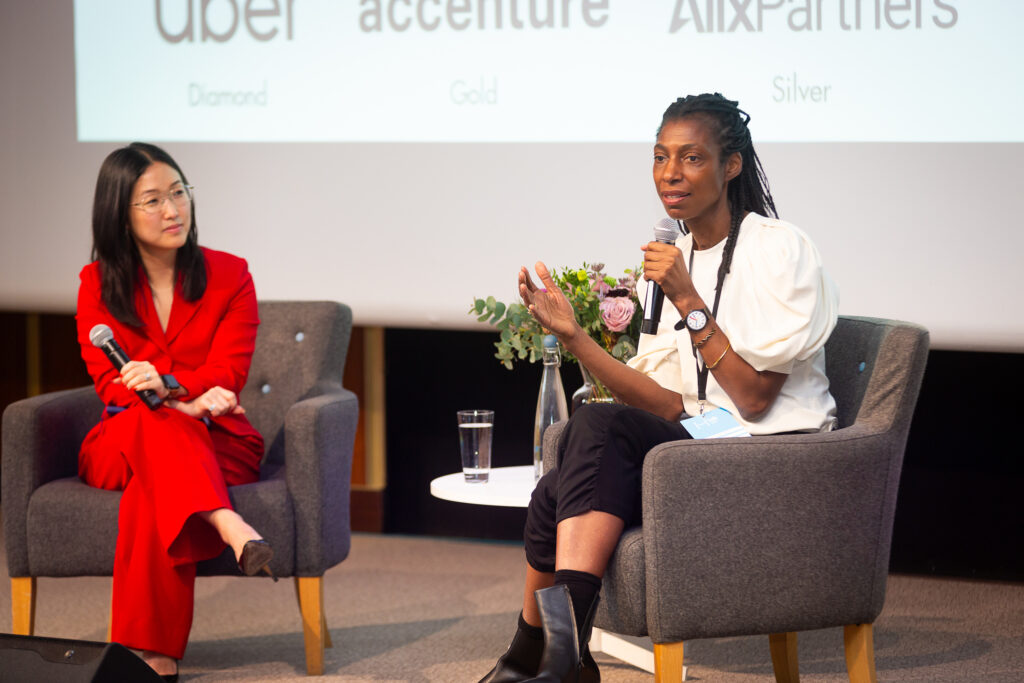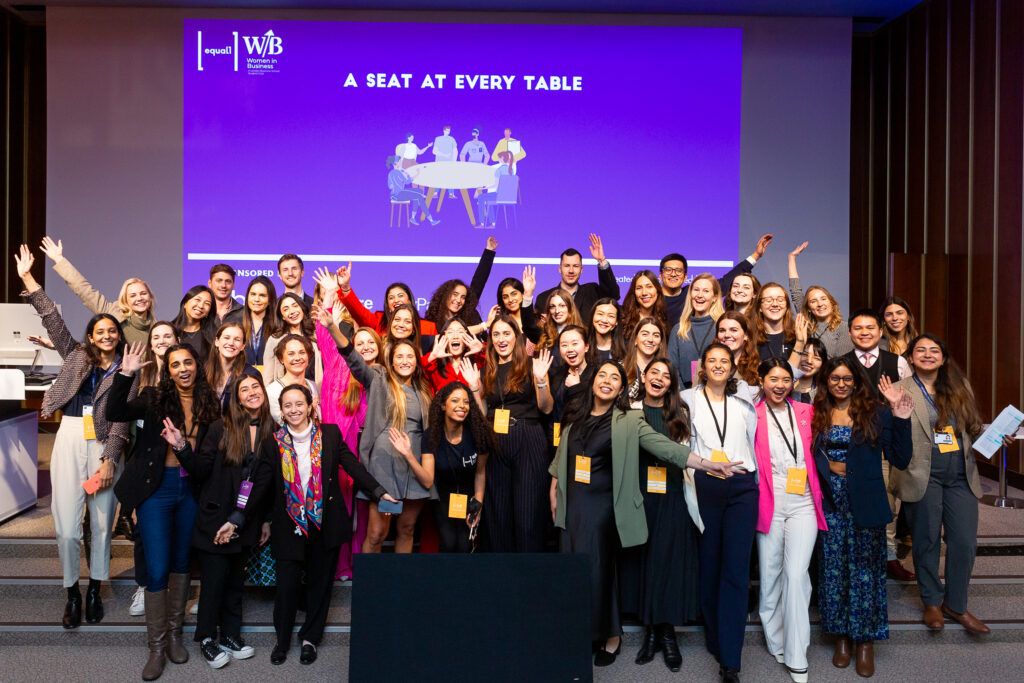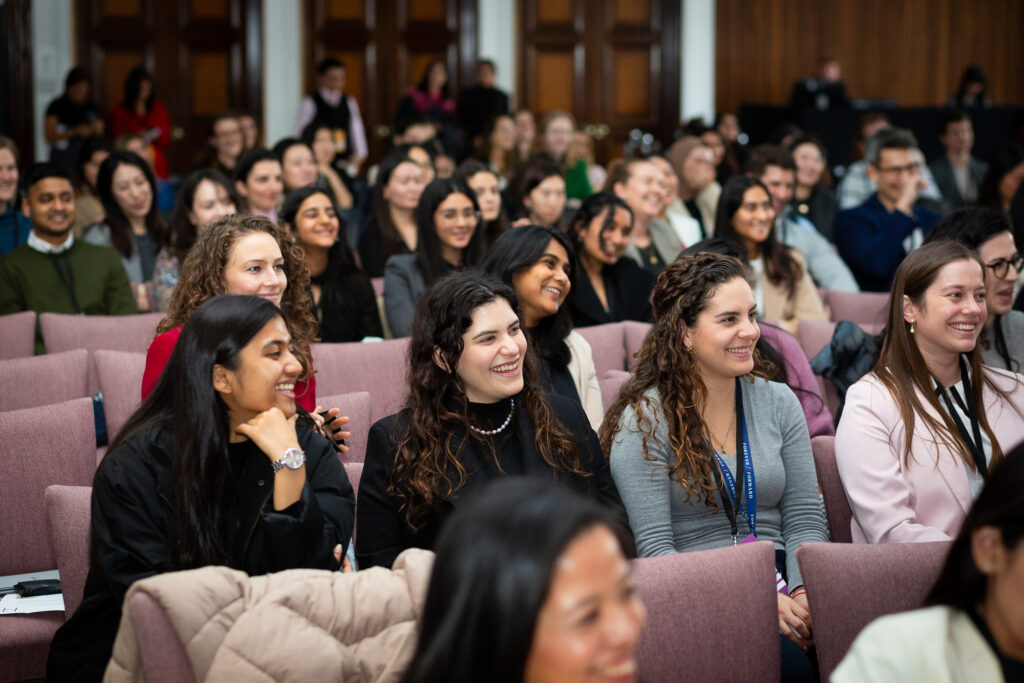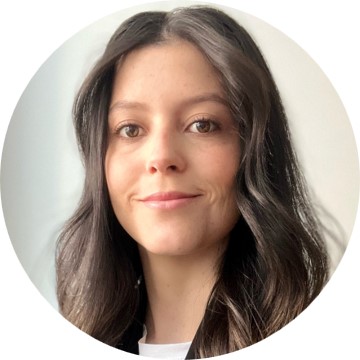The Women in Business Club at London Business School hosted the 24th annual EQUALL conference, ‘A Seat at Every Table’. The conference brought together leaders and allies from various sectors to share insights into the unique challenges and opportunities women face. The conference aimed to inspire and provide practical strategies, featuring a range of keynotes and panels that focused on empowering women in the corporate world, investment, entrepreneurship, and health.

In conversation with Dame Sharon White
The event began with Dame Sharon White (Chairman at John Lewis Partnership), who discussed her career journey. She shared insights from early in her career in male-dominated environments, where she learned about the differing expectations placed on women in decision-making roles. Reflecting on her time at the Treasury, White recalled being one of three women economists and observed no female presence on the board. Her efforts and those of other women during the early 2000s were key in transforming the Treasury into a more gender-balanced workplace. She emphasised that change was driven by data, a strong sense of passion, and the crucial role of allyship between women and men.
As the conversation shifted toward her upcoming departure from John Lewis Partnership, White shared that her future choices would be determined by purpose and flexibility. She encouraged the audience to have fun with what they do, ending, “It is about love, fun, and passion that fits your purpose. And don’t worry about failing.”
Thriving, not surviving
The next panel tackled women’s health and career balance challenges in a demanding work landscape. Despite advances towards equality, there is still little support for women-specific health issues, such as endometriosis and menopause. The panel featured Rebekah Lloyd (CEO of This Independent Life), Dr. Sula Windgassen (CEO of Mind Body Blossom), Dr. Mridula Pore (Co-founder of Peppy), and Dr. Linia Patel (CEO of Linia Nutrition).
Lloyd shared her personal experience with the lack of support when she was diagnosed with endometriosis, highlighting the difficulty the scarcity of information and in getting a diagnosis. Echoing Lloyd’s concerns, Dr. Windgassen pointed out the underfunding of women’s health research. She emphasised the crucial need for holistic support that combines psychological and physical health and observed that women often feel disregarded rather than supported.
The conversation then pivoted to the intersection of women’s health and careers. Lloyd noted the lack of dialogue around how health issues impact women’s professional lives, a sentiment Dr. Pore echoed by highlighting the importance of addressing women’s health within the workplace. She pointed out that menopause and fertility issues can significantly affect women’s career trajectories, sometimes not allowing them to go in the same straight line as their male counterparts. Dr. Patel added to this by identifying a notable gap in nutritional science tailored for women, stressing the importance of understanding how hormonal differences determine the nutritional necessities in different life stages.
Lloyd introduced the AKA framework: Awareness, Knowledge, and Action. This model underlines the importance of emboldening women to recognise their symptoms and stop normalising their pain. It encourages a comprehensive education on women’s health for both women and men.
The panel concluded with four key messages:
1. Share your stories.
2) Interest, investment, and innovation is needed to support education and research on women’s health.
3) Develop awareness on how your personal psychology is affecting your actions.
4) Track your cycle and get to know yourself.
Women investing in women
This panel discussion began with a powerful video message from Jesse Draper: “Investing in women is not a f**king charity.” This statement set the tone for exploring the challenges and opportunities in supporting women-led ventures. The panel was formed by Jamie Kramer (Global Head of Alternative Solutions at J.P. Morgan Asset Manager), Jen Braswell (Head of Impact of the Private Capital Business at EQT), Dinika Mahtani (Partner at Cherry Ventures), and Ayesha Ofori (CEO and founder of Propelle).
Ofori started the panel by sharing her journey as a black woman in entrepreneurship. She highlighted the additional challenges she faced, including being asked questions about her plans for motherhood. On the other hand, Kramer offered pragmatic advice for women seeking funding: understand your audience and be confident.
Mahtani commented on the overemphasis on using gender as a criterion to evaluate founders, highlighting the importance of other metrics such as education and background.
The panel collectively emphasised women’s unique perspectives in the business world, including innovative approaches to sectors like childcare and women’s health, areas often overlooked by male-dominated investment committees. The conversation also tackled the issue of unconscious bias in investment decisions, suggesting that seeking common ground could help mitigate these biases.
The panel closed with advice:
1) Surround yourself with a good network of allies and advocates.
2) Grit and determination are essential.
3) Dig into your purpose and passion.
4) Lean on and create diverse teams.
5) Always stand on performance.
6) Be brave.

From Supporter to Sponsor: calling all allies
The discussion centered around the evolution of men’s attitudes towards allyship and the pivotal role of sponsorship in fostering gender equality in the workplace and beyond. Robert Baker (CEO of Potentia Consulting), Marvyn Harrison (Founder and CEO of Dope Black Dads and Beloved Agency), Leigh Walters-James (Managing Director at Accenture UK), and Rema Rao (Head of Payments Compliance and Financial Products at Uber APAC), offered their insights in a session moderated by Catia Dal Poz (Founder and CEO of One Million Voices).
The conversation started with an attempt to define allyship. Baker proposed that allyship extends beyond simply being there for a person or group, but rather it’s the practice of helping and supporting those who are less privileged.
Rao highlighted the complexities women face in finding allies. She mentions that it can be difficult to find men who empathise with the female experience. Leigh reflected on a lack of a defining moment for becoming an ally, attributing his stance to growing up in a supportive environment.
The discussion then shifted to practical steps for promoting gender equality, and that it could start at home. Harrison emphasised the significance of the role men can have in the family. Baker and Rao expanded the conversation to include education and the workplace, noting the importance of integrating diversity and inclusion modules in educational curriculums and embodying inclusive values in corporate leadership.
Walter-James and Baker further discussed the importance of self-education for men to understand and engage with issues like menopause better. They advocated for bravery and the willingness to embrace discomfort as part of allyship. Baker also stressed the need to effectively communicate the benefits of allyship to men to foster a more inclusive environment.
Rao highlighted the critical need for women to advocate for themselves, a skill often not taught from a young age. The panel concluded by emphasising the transformative power of sponsorship in pursuing gender equality, advocating for vocal support, and proactive leadership in the causes one believes in.
Together, we rise to navigate diversity challenges in today’s business world
The panel discussion on diversity and inclusion in the workplace brought together Sami Ben-Ali (Head of Diversity Recruiting at AWS Amazon), Ivona Hideg (Associate Professor of Organisation Studies at Saïd Business School, University of Oxford), Christine de Largy (Executive Fellow at London Business School’s Leadership Institute), and Lauren von Stackelberg (Chief Diversity & Inclusion Officer and Global Head of Wellbeing at the LEGO Group).
Lauren Von Stackelberg opened the discussion by emphasising the success of initiatives with tangible outcomes and the critical need for inclusion to be a company-wide policy driven by data. She highlighted the effectiveness of Pulse Surveys in capturing the essence of diversity within a company. Sami Ben-Ali then shared insights from Amazon, noting the importance of gathering feedback from underrepresented communities and implementing the ‘Three Es’ framework: Education, Empathy, and Engagement.
The conversation then addressed the topic of women allegedly finding jobs easier than men due to diversity quotas. Hideg presented three crucial points for consideration: companies hire women based on their qualifications, women’s achievements tend to be overlooked without diversity policies, and men’s qualifications are seldom questioned, with men generally displaying more confidence. She highlighted the significance of targets in enhancing visibility.
Christine de Largy and Ivona Hideg stressed the value of having mentors and sponsors, explaining the difference between the two: mentors provide risk-free guidance, while sponsors are influential figures who advocate on one’s behalf. They encouraged women to seek out sponsors proactively. Lauren shared an innovative approach at LEGO with reverse mentorship, further enriching the dialogue.
To conclude the session, the panel offered advice on evaluating potential employers’ commitment to diversity. They recommended changing the power dynamics by being ready to ask challenging questions during interviews, inquiring about diversity data, and observing team composition to ensure true diversity. This comprehensive discussion provided valuable insights and actionable strategies for fostering diversity and inclusion in the workplace.
Voices from the frontline: Women shaping sustainability
The Women shaping sustainability panel included Claire Perry O’Neill (former UK Minister for Energy and Clean Growth), Lucy Greengrass (Sustainability Strategy Senior Manager at Accenture); Brit Morgan (Electrification Lead at Uber UK), and Sukhvir Basran (Partner and ESG Co-Chair at Cadwalader, Wickersham & Taft LLP).
The conversation kicked off with a comprehensive look at how the definition of sustainability has expanded beyond its environmental roots to include vital social and governmental elements. This broader view emphasises resilience in supply chains and the importance of circular economies.
A discussion continued to the intersection of gender and climate change, highlighting the disproportionate effects of climate change on women. The panelists discussed the need for gender-balanced policies and actions and the critical role of inclusivity in sustainability efforts. They shared insights into gender disparities in the impact of climate change and actions aimed at making the energy industry more inclusive.
The panelists also shared valuable advice for those looking to carve out a career in sustainability, stressing the importance of intentionality and inclusivity. They touched upon the challenges faced in sustainability fields. They stressed the essential contribution women can make in driving the transition towards a sustainable future.

A Fireside Chat with Francesca Carlesi
Francesca Carlesi (CEO of Revolut) reflected on the pivotal role of making intuitive choices. Starting with her initial ambition towards an academic career, which led her to pursue a PhD, Carlesi soon found herself at a crossroads, choosing to transition into consulting. She highlighted the importance of assessing what is genuinely beneficial on a personal level despite the advice from others. She noted that support from family and partners is crucial for navigating life’s challenges.
Carlesi also highlighted the significance of maintaining a passion for one’s work, acknowledging that while it may not always be enjoyable, it is essential for fulfillment. Throughout her career journey in male-dominated sectors such as consulting and technology, she balanced a range of responsibilities with high work standards. Despite these obstacles, she advised against allowing biases to take root, emphasising the importance of consistently putting in your best effort. “It’s up to you to show up every day and do your best,” she asserts.
Venturing into the tech industry without prior extensive expertise, Francesca was driven by the desire to avoid regret and the opportunity to build a team that reflects her values and culture. She described entrepreneurship as immensely rewarding, especially the experience of bringing an idea to fruition. Reflecting on the challenges posed by COVID-19, she noted how the crisis ultimately strengthened team cohesion. Her journey eventually led her to Revolut, where she appreciates the company’s transparency and people-driven approach.
About the author

Juliana Escobar Díaz (LBS MBA 2025) is an Outreach and Communications Intern at the Wheeler Institute for Business and Development. Prior to joining London Business School, Juliana spent four years at McKinsey & Company as a Location and Business Analyst, based in Bogotá. She has a keen interest in business for impact and business as a force for good.
Discover our research portal and subscribe to our mailing list now
